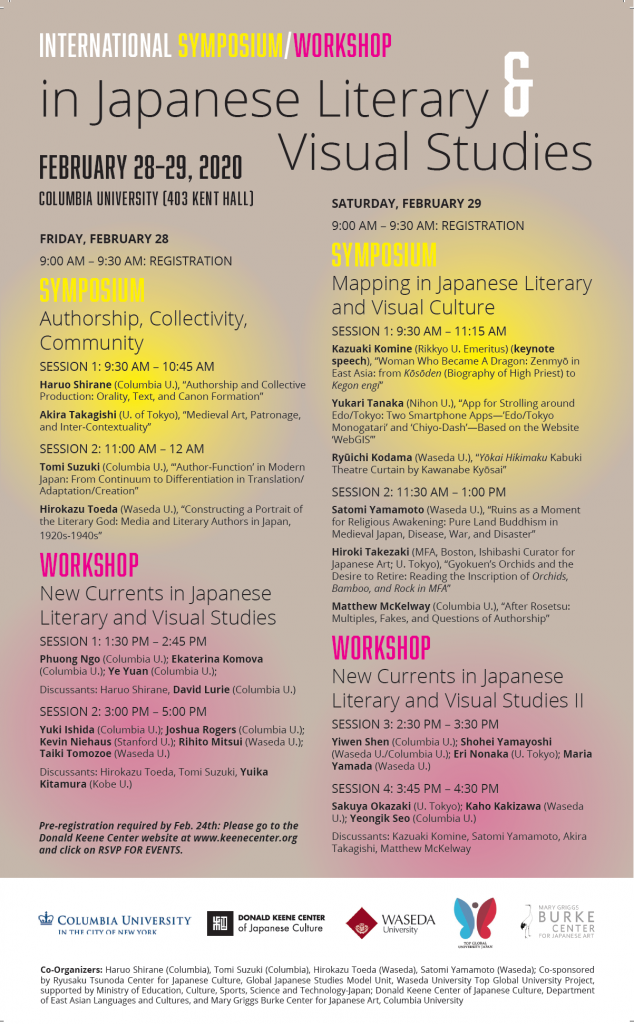TGU Global Japanese Studies model unit is pleased to announce the following International Symposium & Workshop will be held at Columbia University :
Date : February 28 (Fri) & 29 (Sat) 2020
Venue : 403 Kent Hall, Columbia University (NY)
For more detail, please refer to below information:
International Symposium/Workshop
in Japanese Literary and Visual Studies
February 28 (Friday), 2020, 9:30 AM – 5:00 PM
February 29 (Saturday), 2020, 9:30 AM – 5:10 PM
403 Kent Hall, Columbia University, New York City
Symposium: Authorship, Collectivity, Community
February 28, 9:30 AM – 12:00 PM
The age of new media (with its incessant borrowing, remixing, and trans-medial cross-overs) has led to a world in which cultural production often emerges out of groups and multiple meditators, raising the question of authorship and ownership. These issues are particularly relevant to East Asian culture, where copying, deliberate imitation, extensive borrowing, and collective creation have traditionally been central as pedagogical tools and as key modes of literary and cultural production. This is the fourth and final in a series of symposiums on the issues on authorship, following up on the earlier symposiums “Rethinking Authorship in Japan and the World” (March 2017) and “Japanese Theater, Publishing Culture, and Authorship” (March 2018).
Workshop: New Currents in Japanese Literary and Visual Studies I
February 28, 1:30 PM – 5:00 PM
Symposium: Mapping in Japanese Literary and Visual Culture
February 29, 9:30 AM – 1:00 PM
Maps represent geographical and three-dimensional space as flat surfaces. This transferal is deeply interrelated to the production and reception of literary and visual cultures. This session relates mapping to media, words, and representational figures with a view to exploring the relationship between this world and other worlds, city landscape, and the awareness of the broader spaces of regions and states.
Workshop: New Currents in Japanese Literary and Visual Studies II
February 29, 2:30 PM – 5:00 PM
FRIDAY, FEBRUARY 28, 2020
9:30 AM – 9:45 AM Opening Remarks
Haruo Shirane (Columbia U.) and Tomi Suzuki (Columbia U.)
Symposium: Authorship, Collectivity, Community
9:45 AM – 10:45 AM Session 1
Haruo Shirane (Columbia U.), “Authorship, Authority, and Ownership in Premodern Japanese Literary Culture”
Akira Takagishi (U. Tokyo), “Medieval Art, Patronage, and Inter-Contextuality” [in Japanese]
11:00 AM – 12:00 PM Session 2
Tomi Suzuki (Columbia U.), “‘Author-Function’ in Modern Japan in Transnational Context: From a Continuum to a Differentiation in Translation, Adaptation, and Creation”
Hirokazu Toeda (Waseda U.), “Constructing a Portrait of the Literary God: Media and Literary Authors in Japan, 1920s-1940s” [in Japanese]
New Currents in Japanese Literary and Visual StudiesⅠ
1:30 PM – 2:45 PM Session 1
Phuong Ngo (Columbia U.), “Poetry, Performance, and Self-Portrayal in Ise’s Exchange Poetry”
Ekaterina Komova (Columbia U.), “When Affect Loses Its Effect: On the Emotional Communities in Genji Monogatari’s Death Scenes”
Ye Yuan (Columbia U.), “Unofficial History: Conceptualizing the Vernacular Sinitic Fiction in Tokugawa Japan.”
Discussants: Haruo Shirane, David Lurie (Columbia U.)
3:00 PM – 5:00 PM Session 2
Yuki Ishida (Columbia U.), “Exploring the Language of Translation: Futabatei Shimei’s ‘Parent’s Heart,’ ‘The Depression Bug,’ and Literary Standards in the 1890s – 1900s”
Joshua Rogers (Columbia U.), “Overcoming Science and Religion in the Early Works of Yanagi Muneyoshi and Hiratsuka Raichō”
Kevin Niehaus (Stanford U.), “Letters and Gender in Meiji/Taisho Literature: Epistolary Narratives of Chikamatsu Shūkō and Tamura Toshiko”
Rihito Mitsui (Waseda University), “Narrative in the two English translations of Shunkinshō by Tanizaki Jun’ichirō”
Taiki Tomozoe (Waseda U.), “The Potential of Economic Novels: The Case of Yokomitsu Riichi”
Discussants: Hirokazu Toeda, Tomi Suzuki
SATURDAY, FEBRUARY 29, 2020
Symposium: Mapping in Japanese Literary and Visual Culture
9:30 AM – 11:15 AM Session 1
Kazuaki Komine (Rikkyo U. Emeritus), “The Woman Who Became a Dragon, Zenmyō in East Asia: From Biographies of High Priests to The Kegon Engi (On the Founders of the Huayan School) [in Japanese]
Yukari Tanaka (Nihon U.), “App for Strolling around Edo/Tokyo: Two Smartphone Apps — ‘Edo/Tokyo Monogatari’ and ‘Chiyo-Dash’ — Based on the Website ‘WebGIS’” [in Japanese]
Ryūichi Kodama (Waseda U.), “Actors, Patrons, and Kabuki: Kawanabe Kyōsai’s Yōkai Hikimaku Theatre Curtain” [in Japanese]
11:30 AM – 1:00 PM Session 2
Satomi Yamamoto (Waseda U.), “A Journey to Religious Awakening: Illnesses and Pilgrimages in Medieval Buddhist Paintings”
Hiroki Takezaki (MFA, Boston, Ishibashi Foundation Assistant Curator for Japanese Art; U. Tokyo), “The Remorse of Gyokuen Bonpō — Reading the Inscription of Orchids, Bamboo, and Rock in the MFA Collection”
Matthew McKelway (Columbia U.), “After Rosetsu: Multiples, Fakes, and Questions of Authorship”
New Currents in Japanese Literary and Visual Studies II
2:30 PM – 3:30 PM Session 3
Yiwen Shen (Columbia U.), “Barren Women and Snake Queens: A Woman’s Journey in Hell in the Late Medieval Otogizōshi Daibutsu no go-engi (The Origin of the Great Buddha)”
Shōhei Yamayoshi (Waseda U.), “Removing the Gateways: Shuten Dōji and Hoku riku in the Edo period”
Eri Nonaka (U. Tokyo), “Foreshadowing in the Kōmyōji Illustrated Handscroll of The Legends of the Taima Mandala: A Compositional Analysis of Text and Image”
Maria Yamada (Waseda U.), “The Development of the Image of Living Skeletons: From Hitting Grass in a Dream (Gentyūsōda-ga) to Kawanabe Kyōsai”
3:45 PM – 4:30 PM Session 4
Sakuya Okazaki (U. Tokyo), “The Depiction of Famous Places in the Funaki Scenes in and Around the Capital and its Relationship to The Kiyomizu Temple Pilgrimage Mandala and Guidebooks”
Kaho Kakizawa (Waseda U.), “A Study on Hamaguri Kannon by Hakuin Ekaku: The Virtues of Filial Piety as Interpreted in Hamaguri no Sōshi”
Yeongik Seo (Columbia U.), A Reconsideration on The Bodhisattva Fugen and Attehdants in the Freer Gallery of Art”
4:30 PM – 5:00 PM Discussion [in English and Japanese]
Discussants: Satomi Yamamoto, Akira Takagishi, Kazuaki Komine, Matthew McKelway, Haruo Shirane
5:00 PM – 5:10 PM Closing Remarks



